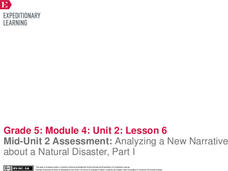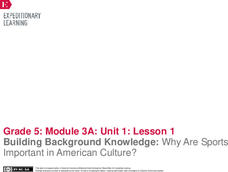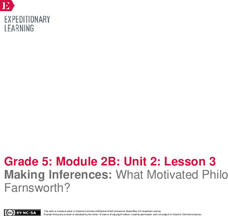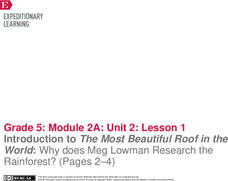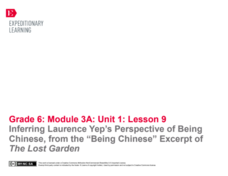American Institute of Physics
Historical Detective: Edward Alexander Bouchet and the Washington-Du Bois Debate over African-American Education
Young scientists meet Edward Alexander Bouchet who, in 1876, was the first African American to receive a PhD in Physics. This two-part lesson first looks at the debate between Booker T. Washington and W.E.B. Du Bois about the type of...
K20 LEARN
Power to the People
Black berets, black leather jackets, raised black fists, chants of "Power to the People!" These are the images that many associate with the Black Panther Party. Often forgotten are the programs the party created during the Civil Rights...
National Endowment for the Humanities
Theme Analysis in A Christmas Carol
Why does Charles Dickens have Ebenezer go from scrooge to light-hearted and generous? From "Bah, humbug!" to "God Bless Us, Every One!" After rereading Dickens' preface to A Christmas Carol, learners analyze quotations from the tale that...
EngageNY
Mid-Unit 2 Assessment: Analyzing a New Narrative about a Natural Disaster, Part I
Scholars complete a mid-unit assessment by analyzing a narrative text, In the Middle of the Storm. Learners determine the gist of the text, identify synonyms, make inferences, and answer text-dependent questions to demonstrate...
EngageNY
Reading Literature about Natural Disasters: Inferring about the Impact of Hurricane Katrina on People Living in New Orleans
I survived! Scholars read a firsthand account from a natural disaster survivor in the text Save Bella! They record the gist of the text in their journals and answer text-dependent questions. They then take notes to more deeply analyze...
Workforce Solutions
On the Job
Four lessons spotlight a variety of professions while boosting listening and observational skills and making inferences. Lesson one challenges pupils to group cards based on a commonality then justify the relationship they see. Lesson...
EngageNY
Building Background Knowledge and Making Inferences: What Is a Natural Disaster?
That's a disaster! Scholars complete a gallery walk to view images and make inferences about natural disasters. They fill out a note catcher about what they observe and infer any questions they may have. They then participate in a World...
EngageNY
Inferring Author’s Opinions and Writing Opinion Statements: Journalists’ Opinions about Segregation Post–World War II (Promises to Keep, Pages 22–25)
Let's play ball! Scholars summarize information from Promises to Keep about segregation in professional baseball after World War II. They then listen as the teacher reads pages 22-25 aloud. Pupils write the gist in their journals of the...
EngageNY
Building Background Knowledge: Why Are Sports Important in American Culture?
What makes sports so special to many Americans? Scholars ponder the question as they participate in a gallery walk, immersing themselves in images and texts about sports. Pupils also complete a vocabulary strategies anchor chart to...
EngageNY
Making Inferences: What Motivated Philo Farnsworth?
Learners continue their work in The Boy Who Invented TV by examining pages 14-17. They work together to determine the gist of the section during a first read then complete a second read to make inferences, create a summary, and define...
EngageNY
Making Inferences: What Motivated Philo Farnsworth?
Turn on the tube. Learners take a look at pages 10-13 of The Boy Who Invented TV. They work in groups and complete a first read to determine the gist of the section. They then reread the pages to make and revise previous inferences and...
Academy of American Poets
Teach This Poem: "In the Next Galaxy" by Ruth Stone
Imagine what life might be like in a different galaxy. That's the challenge young scientists take on in a warm-up activity designed to prepare them for a close reading of Ruth Stone's poem "In the Next Galaxy." After class members share...
University of British Columbia
Pondering Poetry and Playing with Words
First-year High school scholars explore the world of poetry with an 11-lesson unit that examines a range of poetry forms and tries their hand at crafting their own poems. Young poets then collect their work in a portfolio that they...
Angel Island Immigration Station Foundation
How Do Pictures Tell the Story of Angel Island?
Young historians learn more about the history of Angel Island Immigration Station through their analysis of primary source images. Guided by a list of inferential questions, scholars learn how to make and record observations on a...
EngageNY
Introduction to The Most Beautiful Roof in the World: Why does Meg Lowman Research the Rainforest? (Pages 2–4)
Let's go for a walk. Scholars take a book walk through the text The Most Beautiful Roof in the World and create an anchor chart to list the features of informational text. They then take a close look into the character Meg Lowman by...
EngageNY
Making Inferences About Informational Text: Science Talk on How My Insect Contributes to the Rainforest Ecosystem
We need to talk. Learners participate in a science talk by discussing the idea of how insects are important to the rainforest. They record notes about their conversations as they talk. For homework, pupils add to their field journals.
NASA
The Big Climate Change Experiment Lesson 3: Climate Change Lines of Evidence
Consider the preponderance of evidence when making a verdict. The third of five lessons in Unit 1: The Big Climate Change Experiment focuses on the evidence for climate change. Learners study graphs, diagrams, and pictures regarding...
EngageNY
Inferring Laurence Yep’s Perspective of Being Chinese, from the “Being Chinese” Excerpt of The Lost Garden
It's all about perspective! Using the resource, scholars read a third excerpt from Laurence Yep's autobiography, The Lost Garden. As they read, individuals complete graphic organizers using clues from the text to infer the author's...
EngageNY
Introducing The Lost Garden and Finding Evidence of Laurence Yep’s Perspective on What It’s like to Fit into Another Culture on Pages 66– 67 of Dragonwings
How does culture shape perspective? Pupils consider the question as they read an excerpt from Laurence Yep's autobiography, The Lost Garden. Using a graphic organizer, they gather textual evidence and make inferences about the author's...
EngageNY
Inferring Laurence Yep’s Perspective on the Police, from the Crime in the Neighborhood Excerpt of The Lost Garden
Gist get to the point! Pupils read another excerpt from The Lost Garden, author Laurence Yep's autobiography. Working with partners, scholars annotate the text to look for the gist and record unfamiliar vocabulary in their word catchers.
EngageNY
Launching the Module: Quotes about the Middle Ages
Pick a corner. Scholars receive a quote about the Middle Ages and then participate in a four corners activity by choosing a corner pertaining to their quotes. They then work in groups of three to discuss the bold words in their quotes....
EngageNY
Reading Closely to Build Background Knowledge: “Myths and Legends”
That is a myth! Scholars take a look at Greek myths referenced in The Lightning Thief. As learners listen to stories in Myths and Legends, they imagine the sights and sounds described. Pupils then talk with partners about specific words...
EngageNY
Mid-Unit 1 Assessment: Making Inferences from Percy
Time to shine! Scholars show everything that they have learned so far in the unit by completing a mid-unit assessment. In the assessment, they discuss the gist of sections of text from The Lightning Thief and inferences they made about...
EngageNY
Inferring about Character: Getting to Know Percy (Chapters 1 and 2)
What a character! Scholars look at two chapters in The Lightning Thief to make inferences about the character Percy. They record both the character's challenges and responses. Learners then work in their triads to discuss the gist of...





